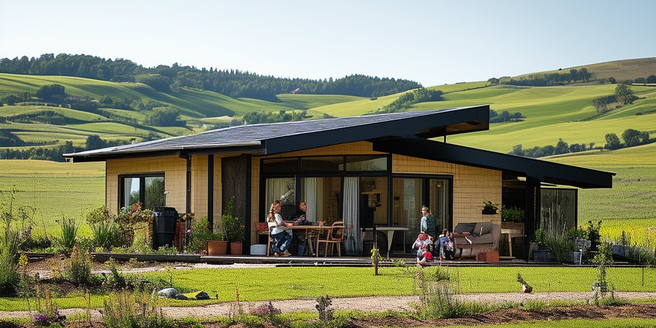Understanding Rural Housing Loans: An Overview
Rural housing loans provide essential financial assistance to low-income families residing in rural areas, allowing them to secure affordable housing. These loans are fundamental to promoting both affordable housing and broader community development in underserved regions. They are typically offered by government agencies such as the U.S. Department of Agriculture (USDA), which has programs specifically designed to support rural residents.
Understanding the basics of rural housing loans is crucial for anyone considering this financial assistance. By being well-informed, you can better comprehend your options and make a more educated decision regarding your housing needs. This section delves into the various types of rural housing loans available, each with its unique features and benefits, and outlines the eligibility requirements you need to meet to qualify for these loans, which may include income thresholds, credit score criteria, and property location restrictions.
Moreover, the steps involved in the application process are covered in detail, providing a clear pathway from initial inquiry to final approval. By familiarizing yourself with these steps, you can navigate the often-complex application process more smoothly and increase your chances of securing a loan.
Eligibility Criteria for Rural Housing Loans
Qualifying for a rural housing loan involves meeting specific criteria, such as income limits and property location. Understanding these requirements will help you determine if you qualify for financial assistance. To begin with, applicants must have a stable income that meets the specified limits set by the housing program. Additionally, it is essential to have a good credit history to demonstrate financial reliability and the ability to repay the loan.
Property location is also a significant factor in the qualification process. The property must be situated in a designated rural area to be eligible for the loan. This helps ensure that the funds are directed towards supporting rural communities and promoting development in those regions. Some programs may also mandate that you be a first-time homebuyer, which means you must not have owned a home in the past three years.
Furthermore, certain rural housing loan programs may have additional requirements or conditions that you need to fulfill. These can include attending homebuyer education courses or providing evidence of a consistent work history. By comprehensively understanding these various requirements, you can better evaluate your eligibility for financial assistance and embark on the journey of securing a rural housing loan.
Types of Rural Housing Loans and Grants
Rural housing loans come in several types, including direct loans, guaranteed loans, and grants. Direct loans offer low-interest rates and are aimed at very low-income applicants, making homeownership more accessible to those who might not otherwise qualify for traditional financing options. Guaranteed loans provide a government-backed guarantee for private lenders, making it easier to obtain a loan. This type of loan is beneficial for those who may not have high credit scores or sufficient financial history but still want to own a home. The government guarantee reduces the risk for lenders, encouraging them to offer loans to a wider range of applicants. Grants are typically used for home repairs and improvements, which are crucial for maintaining the safety and livability of rural homes. By providing financial assistance for home improvements, these grants ensure that rural dwellings remain safe, up-to-date, and comfortable for their residents. Overall, these various types of rural housing loans and grants play a critical role in supporting homeownership and enhancing living conditions in rural communities.
Application Process for Rural Housing Assistance
Applying for rural housing assistance involves several steps, starting with determining your eligibility. You will need to gather important documents, such as proof of income and credit reports. This is essential because providing accurate and detailed financial information can significantly impact your chances of approval. The application process may include pre-approval and a property appraisal. Pre-approval is a critical step where lenders review your financial status to ensure you qualify for the loan. Additionally, a property appraisal is necessary to assess the value of the home you want to buy, ensuring it meets the loan requirements.
Consulting a housing counselor can provide valuable guidance through this process. Housing counselors are knowledgeable about the various loan programs, eligibility criteria, and the documentation needed for your application. They can help you understand the complexities of the application process and advise you on improving your credit score if needed. Moreover, housing counselors can assist in identifying any local or state-specific programs that might offer additional support or benefits. By following these steps and seeking professional advice, you can navigate the rural housing assistance application process more efficiently and confidently.
Benefits and Challenges of Rural Housing Programs
Rural housing programs offer various benefits, including affordable housing options and community development support. These programs are designed to make living in rural areas more accessible and appealing, particularly for low to moderate-income families. Although they provide significant advantages, rural housing programs also come with challenges that need to be carefully considered. Limited funding is one of the primary issues, often leading to long wait times and competitive application processes. Furthermore, geographic restrictions can limit the availability of these programs to certain areas, making it difficult for some individuals to participate. Understanding both the advantages, such as the potential for lower living costs and stronger community ties, and the potential drawbacks, such as funding constraints and location limitations, can help you navigate the complexities of rural housing programs. With a thorough understanding, you can make the best decision for your needs and work towards securing a beneficial housing arrangement that supports your lifestyle and financial situation. By weighing these factors, you’re more likely to find a program that offers you the support and resources you require while also addressing any possible complications you might face.



